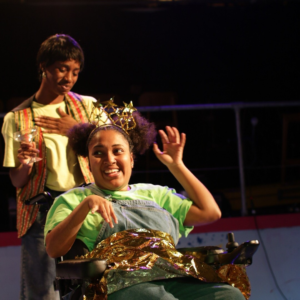A welcome to the ‘Letters to Fellow Writers’ series by Chinonyerem Odimba
In an introduction to a brand new six part series in partnership with tiata fahodzi @TiataFahodzi Artistic Director and Chief Executive Chinonyerem Odimba to invites us…

In the first of a brand new six part series in partnership with tiata fahodzi @TiataFahodzi we hear from award-winning playwright and screenwriter Matilda Feyiṣayọ Ibini.
Dear Fellow Writer,
Yes I’m talking to you. You who might not have told anyone that you write yet. Or you, you’re thinking about writing but haven’t started yet. I’m looking at you – who wouldn’t call yourself a writer because you haven’t had anything produced yet (btw you are a writer). I’m talking to you, fellow writer, who might not have sent out their work into the world yet and so are yet to feel that separation anxiety about what your work could be doing or could become, you who hasn’t yet lost sleep over who could be reading or interpreting your work. I’m talking to all of you.
During this panini I’ve had some time (really too much time) to reflect over my career and how exactly I found myself here. There have been pivotal moments, chance meetings, dizzying highs and hellish lows. From moving away from writing solely for myself, to writing scripts nobody wanted, to then writing scripts that somehow managed to cross the finishing line, and sometimes it’s a wonder how that happened but what I realised was the many decisions that got me there.
When deciding to become a writer, it is never an easy decision – it takes a dollop of courage, a heap of hope and a sprinkle of fear just for good measure. This recipe is a mess but what I’m saying is that it’s not a decision one takes lightly so if you’re at the stage of thinking about it – good. You need thinking time. If you’ve started to take tentative moves to writing or have started putting words to page, even better.
It’s never a straight-forward journey. Irrespective of your reasons for deciding to go on this journey at some point you’ll come to realise that there are many routes in, but not all the routes lead you somewhere better or even different. So I thought I’d share some insights I’ve learned, that may help (or not) you on your way. As you begin this trek you will notice how some people in this industry get stepping-stones, some people get stepping bridges while others inherit stepping super-highways. Meaning your journey to becoming the writer you dream of – is not impossible but you will need to locate, dream or create your own stepping-stones.
And if you’ve ever watched Takeshi’s Castle [a Japanese game show from the late 80’s but reruns were played in the early 2000’s], there’s a level in the show where contestants have to cross a swampy lake by using identical stepping-stones, however not all the stepping-stones are solid. Some of the stones are floats, so if a contestant steps on a float, they sink and they’ll end up in the swamp. But if the contestant manages to avoid the fake stones and get across to the other side of the swamp, without falling in, they win the level. Don’t ask me why but I’ve often thought my career is like this particular game. Each time I play I’m hoping to get my script across to the other side dry, intact and ready to be produced but I’ve fallen into the swamp more times than I’ve made it to the other side. You realise the same routes won’t always work because the stones are reshuffled every time you play, and sometimes there are moments of genuine panic that when I end up in the swamp I may never get out of it. But the game always resets the moment you decide to tell a new story, a better story or maybe just a different story. And it’s ok if it’s guess work whether or not the stepping stones are real or floats, you’ll learn to cross better, smarter, you’ll even start wearing water proofs to ready yourself, because it’s not the end if you fall in, as Shrek (2001) has helpfully demonstrated, swamp life’s what you make it.
And as a writer who started not knowing anyone in the industry, when I started taking my writing seriously, for a long while the lack of contacts or connections can make you feel lonelier than the writing does. It was like everyone is in this exclusive club and I had no way of getting in. But like a story you have to start somewhere with whatever crumbs you have or can find.
I remember the first time watching and going to a theatre in secondary school that wasn’t a panto or TIE (theatre in education) show. You know the ones ‘drugs isn’t cool – just say no’. It was a class trip to see Joe Guy at Soho Theatre. I realised I was watching the show but I was also watching the audiences reactions to the show and I wanted to understand more. How do stories do that? Make us lean forward.
This provided one of the first stepping-stones – a realisation that theatre could be much more than fairy tales or blunt, didactic stories on sex, drugs and knife crime.
The next stepping-stone was my local library. My older sister always used to take me and my younger siblings to the library to do activities when my mum was working (so like all the time). It meant we spent a lot of time at the library and what started as a place to read Asterix & Obelix and X-men comics became a place of knowledge, when my older sister challenged me that if I wanted to learn more about writing – that there were probably books in the library that I could learn from. She helped me find the two following books:
‘So You Want to Be a Playwright?’ by Tim Fountain and ‘Writing for the Screen: Creative and Critical Approaches’ by Craig Batty and Zara Waldeback.
Look I’m a slow reader, I’d not read any plays outside of school and wasn’t confident at understanding what the difference was between a play and a screenplay other than their spelling. So it took me some time to understand the terminology in those books but gradually they helped me join the dots of how what I would see on stage and screen came to be. I borrowed those books out of the library, renewing them for over a year (and successfully dodging all the fines) until the librarian suggested why didn’t I just buy the books, since I needed them so much. Well, I wasn’t exactly working at the time, but as soon as my first student loan payment hit my account, those two books were my first purchases.
The gap between stepping-stones varies, sometimes its small, whilst the gap between others require us to take a big leap or spend time building a bridge to reach it. Stepping-stones have been known to move further away, edge closer or sink by the time you reach them. Not because it’s a missed opportunity but rather it’s no longer of use to you. You can outgrow or even skip a stepping-stone if you find that it isn’t taking you anywhere. Or sometimes stepping-stones can take you down an unexpected route to work you never imagined making or help you discover new ways of developing and understanding your craft. Stepping-stones aren’t always a forward step or advancement in one’s journey but can be a useful nudge onwards, even when you’re not sure where it might take you.
The next stepping-stone was focusing on one medium, I couldn’t learn stage and screen at the same time, so I prioritised which medium I would focus on first, knowing I would get to the other eventually. I chose stage and then applied for a tonne of free or heavily discounted writing courses (but it unfortunately feels as though there aren’t as many as there used to be when I started out). But of the ones you do find, some courses or programmes offer bursaries or scholarships so it’s always worth finding out. Money shouldn’t be a barrier to development and opportunity, but it often is. The results: I got selected for a few courses and rejected from most. Some took a few applications before I did get a place, whilst others I realised, I was knocking on a door that wasn’t going to open.
Now I know courses aren’t for everyone but what the right ones can provide is structured time for you to focus on developing your craft and understanding in a supportive environment, opportunities to network but more importantly the opportunity to develop support networks long after the course has ended, (as well as access to a library of plays or free or discounted tickets to see work). Courses also provide accountability when it comes to writing and learning how you work with deadlines. Deadlines shouldn’t work against you, but with you and the other responsibilities in your life. Something I admittedly still have to regularly remind myself that this thing called writing is malleable, it should mould around your life, you shouldn’t have to contort yourself into a pretzel for your writing (granted this is much easier said than done).
Another stepping-stone I discovered was the art of writing a short play. Now a short play isn’t any easier than writing a full-length play just because it’s shorter. Sometimes I think of short plays like Fabergé eggs (I’d just like to point out I’ve never owned a Fabergé egg in my life or even seen one in person). However, if you search images of them, Fabergé eggs are small, detailed, intricate pieces, each unique and make a statement on just a first glance. I think that’s how short plays work, they make a statement as quickly as they can, whilst also being beguiling. I wrote a lot of short plays earlier in my career (mainly unpaid – boo) but I was either studying or working so they were short commitments around my studies or my part-time job. Short plays are a great playground to test out very early, not fully formed ideas or characters that I have before embarking on the full-length play, as well as giving me a chance to hear work aloud because that’s how you really get a sense of the story you’re trying to tell. Staging a short play can also be a great way to network, I was often paired with directors (as I didn’t know any directors personally) but stayed in touch with the directors and actors that I got on with, which often led to me working with them on multiple occasions. You get to a point where you’re mutually recommending collaborators you’ve worked with for projects, and they may also bring you into other opportunities. You become part of this supportive and generous network, where another person’s win is all of our wins and we become each other’s cheerleaders.
As you grow into yourself, you’ll also grow into yourself as a writer/artist/storyteller/maker whatever title you decide on that feels right for you. Within that growth there’s finding the balance in knowing when to sidestep, step back and pause – not wait – that’s a different thing but literally pause – give yourself the time and space to breathe, restore and reflect. Because as you develop your craft what you want will change – where you thought you were heading doesn’t seem so glittering. Hopefully the various stepping-stones that have led me to where I am today can act as a kind of roadmap and that there are so many routes you can take. Just like there isn’t the perfect story, there isn’t the perfect route. So have a think of what could be your first or next stepping-stone.
Another stepping-stone could be submitting your work to competitions and open submissions for development opportunities. How often you do this is up to you, but it’s important to take into account the capacity you have to prepare applications and whether you feel your work is ready. I don’t think there are any hard or fast rules. I’ll admit I’ve submitted things last minute (not after the closing date). I mean that I thought I wasn’t going to apply and ended up applying literally an hour before it closed. Or submitting plays that I didn’t always feel were entirely ready, but the way I see it is that by submitting my work, I’m letting people know I am in the industry, you truly don’t know who is reading the submissions (it could even be a future collaborator – yes this can happen). So many directors, dramaturgs, writers, producers, literary managers etc can be involved at various reading stages of a competition or open submission that you enter. Particularly with the annual or biennial competitions, hopefully with each passing year you have new work to submit or have developed work further since the last submission window. In this industry it helps to have a growing portfolio of work even if they are yet to be produced. And the last thing I’ll say is about competitions, is to enter with the awareness that rejection could be the outcome but that rejection doesn’t have to result in your retirement. I do understand that we are all fighting long, ingrained prejudices inside and outside of this industry and if you decide competitions aren’t for you, that is totally fine, because awards don’t maketh the writer – your words, imagination and tenacity does. (Extra shout out to the parents, caregivers, those living with chronic conditions or anyone facing complex obstacles that take time and energy out of their daily lives and have yet persevered on despite deep-rooted discriminations and nepotism rife in this industry – I’m so glad to be in this industry with you – please don’t stop telling your stories).
I know I’ve used this stepping-stones analogy to death in this letter, but I guess what I’m trying to stress is that though the destination may not always be clear, or feel very far away, have a look around you – there may be a step to take. This letter is by no means an exhaustive list of all the stepping-stones that have got me to where I am, otherwise, this letter would have been a book. Writing may be lonesome but building a writing career doesn’t have to be. There were pivotal mentors that provided key pointers about which stepping-stones to avoid. My peers have had and continue to have a big influence on me, buoyed me when I’d fallen into the swamp of imposter syndrome and inspired me with, their own storytelling, resilience and compassion, and meeting my kind and compassionate agent, a tireless champion of my work and well-being. And so on.
To you, fellow storyteller wherever you are reading this, I hope that you find stepping-stones that lead you down pathways that aren’t ableist, racist, sexist, ageist, elitist, homophobic, transphobic, Islamophobic, antisemitic (and all the other ists and ics that I haven’t mentioned). May stepping-stones light up the way for you that are not traumatising, that do not shrink you, or compromise your identity, integrity, access needs or well-being. And that your stepping-stones lead you to your dreams (however small or grand) and beyond. And then some. And further still.
Yours always in solidarity,
Matilda Feyiṣayọ Ibini



All photo credits: Kofi Dwaah
Matilda Feyiṣayọ Ibini is an award-winning, bionic playwright and screenwriter of Nigerian heritage from London. Matilda was selected as a Star of Tomorrow 2020 by Screen Daily Magazine, a feature film screenplay she co-wrote with Gabriel-Bisset Smith was selected as part of The Brit List 2020 and she is an Arts Foundation Futures Award 2021 Finalist. Her work has been staged at the Old Vic Theatre, Shakespeare’s Globe, Royal Court Theatre, Soho Theatre, Arcola Theatre, Bunker Theatre and Vaults Festival. She has screen projects in development with BBC Films, Home Team, Ardimages UK and Raw TV.